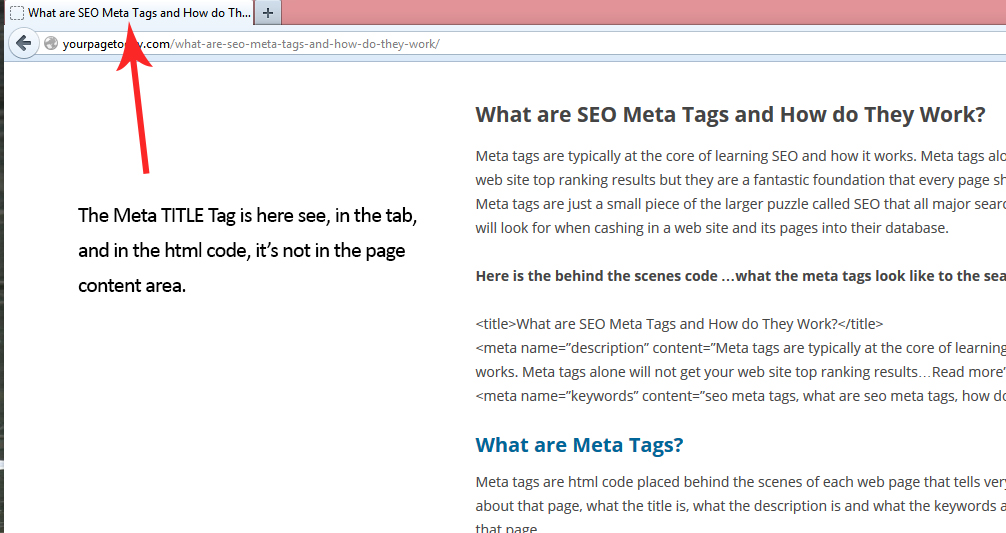What are SEO Meta Tags and How do They Work?
Meta tags are typically at the core of learning SEO and how it works. Meta tags alone will not get your web site top ranking results but they are a fantastic foundation that every page should be built upon. Meta tags are just a small piece of the larger puzzle called SEO that all major search engines like Google will look for when cashing in a web site and its pages into their database.
Here is the behind the scenes code …what the meta tags look like to the search engines:
What are SEO Meta Tags and How do They Work?
What are Meta Tags?
Meta tags are html code placed behind the scenes of each web page that tells very important things about that page, what the title is, what the description is and what the keywords are that are relevant to that page.
The meta tags help control what displays on search engine query results.
Lets Break it down, shall we?
Meta TITLE Tag:
The meta Title Tag is among the very most important elements, the title tag is what search engines, like Google, look at as being the most important keyword phrase that you want that particular page to rank in a search for. The title tag should contain the keyword phrase that you think your target audience will type in to a search query find that particular service, post, or page of information, and it should be completely unique on each page and should contain not much more than 60 characters as most search engines only use a maximum of about 60 characters for the title tag.
Consider the title tag as being the most important keyword phrase for any given page, you have to think about your ideal target audience … and what you think they might type into a search engine query to find your services… if they don’t know your company name and they only know what they are in need of, …that should be the title for that page. You can have a list of keyword phrases that you wish to be found for, but you only want any given page to be found for one key phrase at a time, because trying to be found for too many keyword(s) phrases on one page will lower the relevancy (ranking ) of each page.
Now this leads me to what’s called “Long Tail Key Phrases” ….Whazzat????
Here is a good for instance, on my web site …if I wanted to be found for web design (that’s just a keyword) ….chances are slim to none in the world of SEO (because its organic results, and i’m not paying the search engine to rank me, I am optimizing) BUT If I create a page all about web site design and my title is “Custom web site design MA” (long tail key phrase) then 1. I am targeting my ideal audience, because I want those customers who want a custom design company and 2. they are local, the ideal client for me. With that long tail key phrase I am certain that I would rank pretty high in the search results.
Meta DESCRIPTION Tag:
Meta description tags are important to tell search engines what the page is all about. With the insertion of a customized description tag you can control what your description on a search engine result says, which is important when attempting to captivate your audience and entice them to click in and visit that web page.
The Keywords Meta Tag
Back in the beginning of the SEO era the “keywords” meta tag was an extremely critical element for search engine rankings. However, that’s not the case anymore, in fact the meta title is really considered the most important set of keywords for any given page.
The only search engine that really looks at the meta keywords anymore is Bing – and they only use it to help detect sites that may contain spam. Its really not necessary to add the keyword meta tag, in fact you can really save time by not bothering with it.
Great Tips:
Search Engines like Google love to check if those key phrases that you want any page to rank for is actually relevant to the content on the page, here is how you can earn Google Brownie points!!
Your Meta Title, does it contain the same keywords as in your on-page h1 title? Yes …Extra Boost!
Your Meta Description, does it contain actual content that’s on the page? Yes …Extra Boost!
Do you have keywords on the page content that are h1’s h2’s, bold and linked to other relevant pages on the site? Yes …Extra Boost!



